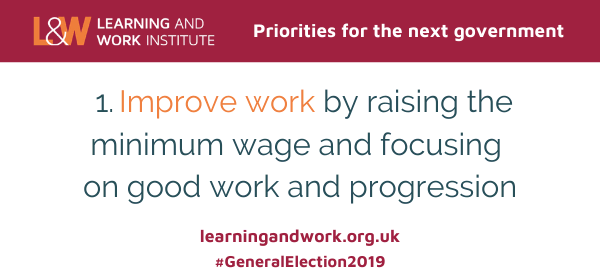Beyond #Brexit – Five things the general election should focus on to fix the foundations of our economy

Fixing the foundations: Cutting services that will help boost growth is a false economy
Brexit will be central to the UK’s first December General Election in almost a century. But there’s plenty more for all parties to focus on.
The context is a relatively weak economy. Average earnings are almost back to 2008 levels, but that means a lost decade of earnings growth compounded by cuts to working-age benefits. Economic growth is lower than pre-recession and productivity (the long-term driver of living standards) flat.
Employment is at record levels, but still much lower for groups like disabled people, while work feels insecure for many. Low economic growth means less money for public services, when most have a case for higher investment.
Taken together, this means people are more likely to be in work than a decade ago, but more likely to feel like they’re struggling to make ends meet.
Permanently weak economic growth would mean permanently limited resources for public services or an ever growing tax burden or public debt.
These challenges are only going to sharpen: longer life expectancy is making 50 year careers the norm while a constantly changing economy increases the need for people to update their skills.
They are underpinned by relatively low social mobility: your chances in life are too dependent on where you’re born.
If we don’t take action, we risk people and places feeling left behind.
There are five areas we hope political parties will focus on:
1. Minimum Wage and Good Work
The Conservatives have pledged to increase the minimum wage to around £10.50 per hour for everyone aged over 21 by 2024, while Labour would immediately raise it to £10 per hour for everyone aged 16 and over. Either way, the UK is headed for one of the highest minimum wages in the world relative to earnings.
To date, increases have not harmed employment and the independent Low Pay Commission remains well respected. There is a clear case for increasing the minimum wage, carefully and according to circumstance. But we also need to think how to build institutions for people and employers to work together, given the decline in unionisation is one of the factors that has weakened workers’ bargaining power.
The Labour Party has proposed a greater focus on sectoral bargaining, while the Conservatives have been consulting on changes proposed in the Taylor Review.
2. Universal Credit and Employment
Universal Credit is less generous than tax credits and the four year freeze on working-age benefits rates has contributed to the rise in poverty.
In addition, a range of concerns have been raised about the impact of the five week wait for initial payment (though advances are available as loans) and other elements such as the two child rule which means benefits are only payable for a person’s first two children in most cases.
We argue that benefit rates need to be raised at least in line with inflation, and that other changes like reducing the five week wait and ending the two child limit should be rapidly considered.
While employment is high, we need to do more to help inequalities in employment rates.
3. Skills and Lifelong Learning
Improvements in skills have stalled over the last decade, partly due to the 40% cut in England’s adult education budget, meaning the UK is poised to fall further down the international league tables for skills by 2030.
We need a long-term lifelong learning strategy for England (skills are devolved within the UK) backed by investment.
We showed how a £1.9bn annual investment could, over a decade, boost the economy by £20bn. We also need new ways for people to access learning, including Personal Learning Accounts.
The main parties have recognised the challenge:
- The Conservatives developing a National Retraining Scheme
- Labour proposing a National Education Service
- The Liberal Democrats announcing Skills Wallets for adults.
We need this to be backed up by strategy and investment.
4. Workplace Skills
The apprenticeship levy, a payroll tax on large employers ringfenced in England for spending on apprenticeships, was a positive step forward. It can help tackle our historic, collective underinvestment in training and skills.
However, it risks a £1 billion overspend in England as large employers spend more than the government expected.
Employers have raised concerns about the way it is working, and its narrow focus on apprenticeships misses broader learning in the workplace. The next government needs to fix the immediate funding crunch and work with employers to explore widening the scope of the levy, focusing on productivity and social justice.
5. A Step Change in Devolution
We should look at whether Wales should have increased powers over social security, like Scotland now has. We also need a step change in devolution to combined authorities and other areas in England, building on the limited devolution of the adult education budget.
We have argued for a system of labour market agreements, modelled on the Canadian approach, setting out the services and budgets to be devolved and the outcomes (such as people into work) local areas will deliver.
But devolution must mean more than transferring services from Whitehall to the town hall. We need to find new ways to empower local communities and individuals, as Rochdale Council have done in partnership with us through their Citizens’ Curriculum.
The decision about Brexit is a fork in the road. But the General Election is also a chance to fix the fundamentals, so that we increase prosperity, tackle social injustice, and enable people to take back control of what matters most to them.
Stephen Evans, Chief Executive, Learning and Work Institute












Responses